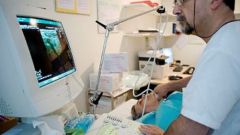Causes and symptoms of cerebral edema
Brain swelling in the newborn may be caused by birth trauma, hypernatremia, water intoxication, brain tumors, infectious diseases (meningitis, encephalitis). Predisposing factors may include illness of the mother, toxemia, hypoxia. Brain swelling is a secondary symptom of defeat. It can be local (perifocal, local) or generalized (diffuse). Brain swelling in the newborn is manifested by the following symptoms: continuous high-pitched cry, restlessness, vomiting, high fever, swelling of the Fontanelle, convulsions.
Treatment of cerebral edema in the newborn
Therapy of cerebral edema in the newborn is based on eliminating the causes of dehydration intracranial structures and decrease the intracranial pressure to normal. If it is the cause of are infectious diseases (meningitis, encephalitis), apply a broad-spectrum antibiotics. Also prescribed corticosteroids. With the steady increase in pressure is applied lumbar drainage. With moderate pressure increase is carried out the evacuation of cerebrospinal fluid, intravenous glucose. When the pressure of the cerebrospinal fluid in dehydration osmotic diuretics include: "Macnicol", "Lasix", urea. In severe cases, they are used to two or three times a day. Mercury is considered less potent diuretics, hypertonic solutions on the basis of glucose. Conducted daily monitoring of ECG, urine output, ionograms, water balance.
Possible complications brain edema
Swelling of the brain of a newborn is a very serious complication, which entails no less serious consequences in some cases, coma, death). Forecast of development of the child, who suffered swelling of the brain, can be as follows: complete cure, a small deterioration of the Central nervous system, the development of very serious diseases that require constant treatment and monitoring by neurologists.
Most often the consequences of perinatal damages of the CNS are: the full healing, delayed mental, motor or speech development of the child, a variety of neurotic reactions, syndrome of deterioration of care, accompanied by hyperactivity, syndrome of vegetative-visceral dysfunction, hydrocephalus, cerebral palsy, epilepsy. After treatment in the neurological Department of the child should be seen by a neurologist, pediatrician, and in some cases a psychiatrist.






